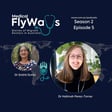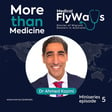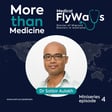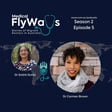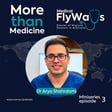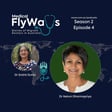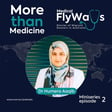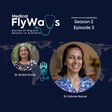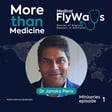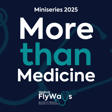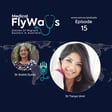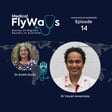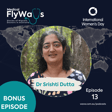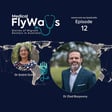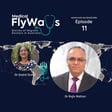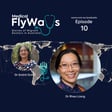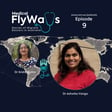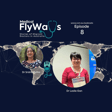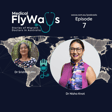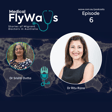Become a Creator today!Start creating today - Share your story with the world!
Start for free
00:00:00
00:00:01

Episode 5: Dr Jenny Huang
Born in Taiwan before moving to New Zealand at age 9, Dr Jenny Huang left NZ at 19 and completed medical training in the UK. She decided upon a career in general practice after enjoying learning a range of different specialties. Now settled in regional Victoria, Dr Huang leads a variety of inspiring initiatives including advocating for environmentally sustainable healthcare and improving the health literacy of regional and rural communities.
Know a doctor whose story needs to be heard? email info@wave.com.au
Recommended
Transcript
Introduction to Migrant Doctors' Journeys
00:00:01
Speaker
Medical Flyways, the untold journeys of migrant doctors in Australia.
00:00:13
Speaker
Thank you, Jenny. Dr. Jenny Huang, who is a GP in ah Victoria and has joined us today to share her story. And this time we thought we would do things differently. Start with a bit of an introduction and have a conversation rather than just me asking questions.
Jenny Huang's Background and Journey
00:00:28
Speaker
So Jenny, how about you start with introducing yourself and all the fantastic work you're doing? I'm Jenny, Jenny Huang, um I'm a GP from the UK and I'm currently working in Western Victoria, so regionally, in Geelong. I have a background where I went to the UK for uni after New Zealand because as a late teen I got bored of New Zealand, I thought the grass was greener and before that, before nine years old, I was in Taiwan.
00:01:01
Speaker
So that's my cultural background, which is probably more relevant here and the fantastic things that I do. I don't know compared to you, Trishti, but let's not do comparisons. But um I guess all of us, you and I, um do our best to try and think of ways to support each other. And I guess particularly because of where we've been in terms of our life journeys, we find it um enlightening to learn about other people's journeys as well as helping each other through that. So it's um it then becomes a learning process for it ourselves about ourselves too. And that's why I kind of do enjoy, you know, supporting other IMGs.
Passion for Climate Health Education
00:01:42
Speaker
Yeah. And then other things is I am very, very passionate about education on climate health, and that's part of preventative care. And I take part in long COVID, but that started with um Dr. Bernard Hsu.
00:01:55
Speaker
I think I will leave it there. Oh, thank you, Jenny. So I'll just add from my perspective, this story is not that different from yours. I grew up in India and probably wanted more freedom and autonomy and just often even freedom of movement. So I did my med school there and then went to the UK where I originally started as a psychiatry trainee and then did general practice training. And we moved to Australia amongst other things to be closer to extended family, but also for both myself and my husband to explore other career options and you know progression in career. So yes, it's funny, isn't it, how we are in different parts of the world, but often our lived experiences are similar in many ways.
00:02:42
Speaker
yeah I guess we met, and that leads to the point you made about supporting
Supporting Migrant Doctors through Social Media
00:02:47
Speaker
others. is ah Jenny and I met through a ah Facebook group called UK to Australia GPs, which was originally started by Dr. Nilesh Champaneri, who is a GP in North Brisbane. and I've been inspired by his generosity in helping so many people through that group that have come from the UK to Australia. and and When you joined the group, I think you were absolutely fantastic in terms of resetting the and highlighting the needs of the next line of GPs that were making the move.
00:03:17
Speaker
Because every time something in the process changes you know the information we need to share and how we navigate it changes as well so yeah like i think our interactions have always been about mutually making each other more self aware and learn from each other. So i absolutely respect that. Oh, so do I. Yeah, but i we both are tangential talkers, so we'll have to keep an eye on that one. I know. That would be interesting to listen back if we can. Yeah. but ah ah You mentioned in terms of supporting IMGs, and I know you've formed some informal groups and networks. Would you be able to tell us a bit more about what what was happening there and how you found that helpful?
00:04:02
Speaker
Yeah, of course. So I always say when people ask me about the group, so it's a WhatsApp group and it wasn't so really the idea that didn't come from me. So there was six of us that was starting on the pet specialist program that had just started back in um end of 2019. And so within that group of six of us, so somehow, yeah, I think we found each other through you the the group that you and Nilesh founded on Facebook. So the person who came up with the idea, she asked me in a separate WhatsApp chat, individual one-on-one chat, Jenny, shall we start a group to support each other? And at the time, I really didn't think much about it. I said, yeah, okay. And she's very much an introvert.
00:04:52
Speaker
And so she decided i had to start it and so i started it again not thinking much about it. And then we did we put it each other in terms of information sharing to navigate the journey because it was everyone was but because we were doing the lived experience it's very different. information and thought processes that we were having and experiencing compared to, say, the recruitment agencies who were helping us or the companies that we were working for who are helping us. That sort of camaraderie conversation really helped within that WhatsApp group. And then from there, it just grew. And it's it's very much word of mouth. And and I guess that's also
00:05:36
Speaker
why and at the moment how it's retained its integrity of what we are after which is purely those going through the process that are supporting each other or those who come out of the other end and have no other agendas. So, I tried to be quite strict about that because we actually did have one person who came in and, invariably, that was not a candidate. So, I had to just explain to them. We're just trying to make sure that this is safe space. Yeah, safe space. That's the word. Yeah. So, I think you've landed on… I'll ask you this at this point. You created a community of practice
00:06:19
Speaker
And ah that's what it would be. It's a group of practitioners that have got a common interest and a willingness to learn about a certain area. That's a good way of putting it. Yeah. but And so that leads me to my next question of, I know you have an educational background and interest. And like from my end, I'm very passionate about GPs with special interest. And one of the other roles that I have as GP liaison, we've created a community of practice for them. so you know They know that there are others potentially managing similar challenges as them. So you've been involved with climate education. I know that you've done a lot of direct engagement as well as policy related. like How did you get the skills that you need for doing all of these things? How have you acquired it along the way?
00:07:06
Speaker
I have to say I haven't gone through any courses or anything and I really think I should at some point but um juggling time is a different topic perhaps or maybe you explore later but um it's it's life I guess and and what we are interested in and how I learned from what I partook in as I came along. I guess um you know it's it's that whole thing where from uni or even before them but you know I'd always been somehow, well, I'm very vocal. So I think that in itself um lands me in situations where I am taking the podium anyway. So then the the sort of vocalness or efficacy hasn't been a, it's just something that happens naturally. But then it's more to do with then how I approach topics and navigate communication with the people who I do want to talk to. That's then learned and then realizing that
00:08:07
Speaker
you know within um a group of whoever I'm educating, it's about what's important to them rather than my own agenda. and That's helpful for me to learn, not just helpful, but I found it so rewarding and I love that. you know when When you learn about their what's important to them, it opens up worlds for us, ways of thinking that you hadn't thought about before, and that interaction in itself is is really wonderful. i think between the two parties communicating. Yes, I was intrigued by what you said because you know having a voice and using it and are both sometimes equally important. So I think you're probably a great example of that and finding what you're passionate about and speaking. I guess for me, the podcast is an example of that, of you know certain things, particularly my interaction with other
00:09:04
Speaker
IMGs and you know women of colour, particularly in Australia, was was what led me to think about doing the podcast. And you've been part of some of that journey, haven't you, with with the presentation of my leadership project and highlighting? Yeah. i I would like to add as well, while you're saying that, is that ah it's it's actually, I would say, you know a good 70% of how I learn. So I didn't go on any courses, but I have such amazing Mentors and colleagues and friends and one of them is yourself and the ability and knowledge and it's your own experiences of bringing things to my attention to think about and discuss it with me without trying to put yourself and say you know bernard like you explore you let me think about it.
00:09:53
Speaker
and then we discuss it rather than have me form an initial impression already and then. I think it goes both ways that I think you're very keen to I mean look I i call myself a an education junkie and a feedback junkie sometimes which is a bit of an extreme way of describing it but like you I think if we are open to learning something you know I'm completely accepting of the fact that as human beings we are not perfect at doing anything and you know If we are willing to improve, there's always room for making sure that things get better. so you know It's about listening. i think Harriet Lerner is a psychologist and there's a quote she has, which I remember quoting ages ago on a panel in a GP conference.
00:10:41
Speaker
which I was very surprised to be on, Jenny, was the other thing I should add. I'm not. I was like, what? Why am I here? it was you know You should learn to listen with the same passion with which you want to be heard. and so you know ah your I think you know our interactions have always been about mutual respect and listening to the other's perspective. and I think that's how we operate even in the construct of patient relationships, learner relationships, mentor relationships. I think that that phrase is so key, Shrishti. I think at some point after this, please please put it down in writing. I really like that because I think it transcends across all sorts of educational you know priorities about that mutual respect and learning. you know When we're talking about IMGs and supervision and all that, it's
00:11:32
Speaker
it It goes both ways. It does. it's It's fascinating. I think we started with culture and yeah it's it's interactions that define culture for me. It's not just people. so You and I have had very different experiences and if we put down everything on a piece of paper, it would feel rather unusual that we've ended up you know having a relationship at all, like even bumping into each other. Very true. yeah yeah so that's I think that's why we've we were aligned in values in many ways in in those things. so Now, I know that your climate work is something that you have you know you're very passionate about. I should add that was something that
00:12:12
Speaker
I felt now obliged to give attention to after seeing your passion. Would you like to tell us a bit more about what got you interested? Was that something that started before you came to Australia?
Climate Health Inspiration from Motherhood
00:12:23
Speaker
you know How did you move that to something that you continue to be interested in? Yes, I think it's very best to just explore that part because otherwise I can go on. But um yeah, so what happened? It was actually having my own eldest that started me thinking about it. And I will just put in here that I'm going to be open about what made me go on this journey with climate health. And that's not on, I'm not judging anybody who then hasn't you know done the same or whatever. Everyone has their own journey of how they learn about what they want to do.
00:12:56
Speaker
just as with everything so it was when i was changing my oldest nappy and then i guess i was seeing that i was you know checking wait eight nappies a day and then i was thinking that's all going to landfill and then i just um started to. Look into it more and then i learned more about how the impact of it and other areas and then i started to realize how it is impacting our. environment which um sources our health, you know, um in terms of the air that we breathe, the food that we do consume, how a lot of, you know, the pollution is seeping into all of that and the, you know, the food chain cycle and that. And so that's why I guess more and more I then realize how preventative care and from my perspective, this is part of that. And that's how I
00:13:56
Speaker
came to look into it. But this was back in the UK 2014. So parallel, I started to also get involved with this group called Facts for Life. And they were based in Gloucester. They were going into schools to educate children from primary school to teenage about health and ill health, in fact, um so that they can equip them about self-care rather than just talking about the normal biology.
00:14:27
Speaker
And so, interestingly, part of that, I guess, back then, because, you know, Gloucester and I was in Bristol at the time, Bristol was very, was starting to get green. And so they were working some of this, you know, being aware of their nutritional values of food sources and things um into their own curriculum. And so it kind of went parallel with what I was looking at anyway. And then what also then brought coming to Australia, it was the timing. So I arrived in November 2019 and that was when black summer happened. And I was enshrouded in smoke. And I guess what really started my emotional thing with this then was that I promised my kids that they would come and they would have
00:15:19
Speaker
green space to play in, fresh air and all that. and Then we landed and we had to be indoors. and When we went out, we had to wear masks. and yeah and Then my eldest at the time was would have been five. and She was like very anxious about the bushfires that was happening and because that's very unfamiliar to her and to me because um I was like, how what is normal in Australia? like I didn't know how to gauge it. and We were in Metro Melbourne and there were fires sprouting like 10 kilometers away, so it wasn't that far. That sort of anxiety became really real for me to experience.
00:16:00
Speaker
Yeah, so so then i I then started to realize how how how close we are to the situation that I thought was quite far away. And then the pandemic happened, which I guess in my own way, and I know not necessarily just my own thoughts, that we do know that infectious diseases and the you know the the cross-species distance is getting less and less as we become more and more resource scarce. and particularly in developing countries where they're really struggling to have food sources that that are technically you know safe.
00:16:38
Speaker
yeah and so There's a lot of um interplay with all of this. and Yeah, so as I say, I can go on, but that's how I then started to look into it also in Australia.
Commitment to Addressing Health Inequity
00:16:50
Speaker
and and if so I'll add my aspect to this, which is different from yours, but it's very similar in theme. and Probably what I'd say is I came from a country where one of the things that was most obvious was the health inequity. and you know moving to the UK to a non-transactional system where, by and large, being able to access health for anyone is equitable. Outcomes may not be. Outcomes are not necessarily equitable because there are other confounders like health behavior and access to... you know It's just the stuff like good food that that not everyone will have.
00:17:24
Speaker
But then i came here and it was a bit of a was a bit of a shift because i realize that in australia some of that transactional element of health and the structures and systems being you know accessible reasonably equitably but not quite. 100% primary care is not funded to be able to provide 100% equitable access either. but Just kind of probably equity and inclusion became just, I couldn't unsee it was the biggest problem and I started seeing it in every place. and
00:17:59
Speaker
That's how the whole women in and particularly women of color and leadership just became unseeable to me as well. when you know If you look at representative organizations as well, there's a gap. Even if you listen to the industries that we don't function in, not just health, there are gaps that are very obvious. and I felt I had to make a commitment to my two girls to improve things, even if it is just a little bit, to the point where there shouldn't be as invisible as sometimes I have felt. so So I think it's interesting, parental guilt can be quite a driver for positive meaning making, isn't it? That is very true. and Parental, grandparental, you know who knows, when we become parent grandparents, we'll approach another journey again. Yeah, absolutely. You are a source of a lot of wisdom, Jenny. so okay Or from what you're saying, I'm just um responding back. so now I was going to ask you, I've often been contacted by people that have only just arrived from you know sometimes the UK, sometimes from even doctors that have been here and are from India or other backgrounds seeking direction or advice. What is it that you think was helpful or important for you in terms of getting where you have got to? What did you do looking, planning, preparing to get to Australia? I think the first thing is that I reached out for help. As I said, I have no filter, so it's not like I
00:19:34
Speaker
I would like to have less be less vocal, but actually I just can't help myself. and So I can't help myself by reaching out when I need help, which is I do know is really good for me because I ask for help and I know that if that person can't help me, I'm very happy for them to say no. But I know that when I've reached out, I've had different sorts of help that's come through and then all together, they add up to become elements of how I have been able to you know, take step by steps journeys. And then that's then lead to a lot of different mentors in different spaces. Again, that ah helps me in different ways because of their own personalities. And it yeah, that's, I would say, again, going back to what you were saying, being open to learning and be open to also be reflective and thinking about what's being
00:20:32
Speaker
given to you and i do use that i'm trying to say given because i don't want to say fed to you because it's very different you know as i was saying earlier to you you've always given me food for thought you don't give me the thoughts you don't give me your thoughts you give me the food for thought and i think that's really important in my growth otherwise i you know i could be a robot and then you can just keep feeding me what you want to. You're absolutely right. um I think it's interesting because I've got a couple of things to add to what you said. is I don't think that I actually did, when I was getting ready and preparing to come to Australia, have a lot of mentors. I certainly had what I'd consider as peer support. so There were people that had made the journey or that were in similar situations to me. so I had a decent peer group.
00:21:21
Speaker
and I think that gap, that mentorship gap, was I should acknowledge, filled by social media connections. It was through GP's Downendo that I then met a lot of people that have mentored me over the years. so and Often, as you said, it was about, like I just have questions. I'd be like, surely someone knows the answer to this. and I just send them a message and go, what like um I noticed XYZ and I can't quite understand why this is. Can you please explain this to me? and ah People have been very generous in sharing their thoughts, their wisdom, their time more than anything else. and Just to acknowledge that I probably have said it a few times for my leadership journey has been Todd Cameron.
00:22:05
Speaker
and Yeah, I think sometimes I wonder how how he can still deal with me. Probably what you're saying, Jenny, is there's a lot of unfiltered, unprocessed things that land on his plate and he will nicely package it and give it back to me. The idea of having mentors, advisors, coaches, you know we all need a few of these and you need to be able to be open and vulnerable to them if you want to learn in the process. Yeah, I think that is so key.
00:22:36
Speaker
about the part about being vulnerable, even myself, you know, I know my immediate responses try to not be vulnerable, especially I think because of the role that we play. We try to be confident. We try to, you know, I think it's also just human nature to make sure that you're ready to fight, I suppose. But actually being open and being vulnerable allows you to learn, allows you to feel you can ask questions. and learn and that's then you then build strength from that. but I think i met I'll mention another person who's been very inspiring from a distance is Dr. Rhea Lang. She's a breast and endocrine surgeon at the Gold Coast and I first, actually I started following her on Twitter ah because I used to like what she said. I'm not a big Twitter or ex as it's called and she said something really interesting in ah in a very short conversation at a leadership forum.
00:23:35
Speaker
She said to me that you have to ensure your own psychological safety before you speak out. And I was quite blown by that because I think what she was saying is that if we see people that aren't open and willing to seek help, it's probably worth making sure they feel safe. know so and And their past experiences, their cultural background, their own ways of thinking might have not been able to give them that space that they need to ask the questions. so
00:24:10
Speaker
yeah but you know I agree with you you and I tend to ask first and think later sometimes. Well, this is a fine example, isn't it? Because um you this is so right, like because you know I guess it's not dissimilar. The example that is rather extreme that comes to my head is You know with our patients say if you've got um someone who's been through trauma you wait until they're ready and just letting them know that you're there and letting them know that you know how you communicate and so that they can reach out in their own ways when they feel ready. That is important across the board too isn't it.
00:24:48
Speaker
Absolutely. yes so we weren't we As you have been, we would with the two of us are not judging anyone that didn't feel safe enough to ask the questions. We just tend to operate in our own way here.
00:25:01
Speaker
yeah yeah One other question about ah your Australian experience is, is there anything that you have done since coming here that you feel?
Self-Care and Professional Balance in Australia
00:25:10
Speaker
And I and i guess I'm probably broadly asking the question. ah For me, it's been about trying things I've not tried before. I've always been happy to give things a grow, which is very much the Australian spirit as well. Jose, anything you've done differently to what you were doing previously after coming to Australia? Looking after myself, actually, first and foremost, i haven't this because ah I haven't actually thought about this question. So, it's a really good question and I'm going to be thinking about this for the rest of the day. But it's a great question because
00:25:42
Speaker
I think because when i was we we came well I came here because I was burnt out. so you know I know that I came here too for my kids and also so because I felt burnt out. I hadn't actively thought I'm going to look after myself, but looking back, that was what I was doing and and now I know i I want to continue to do that. and I guess maybe I'm thinking of that because of what you just said about the psychological safety. I think where I am today and because I feel even more comfortable than ever to to talk, to be approached, is because I feel a lot like psychologically safer than I was even when I was in the UK. and yeah that's it's It's a very good question.
00:26:33
Speaker
Yeah, I mean, individual experiences aside, are there any structures or systems in Australia that have helped you feel safer and be able to manage that burnout in terms of work? I have. actually Well, i I don't know if it's my own experience, but my own experience is that I have found people more open to my suggestions. And that's like, that seems to be most people that I've spoken to. which has been a bit different from back in the UK. Are you referring to, and I think you are, but correct me if I'm wrong, are you referring to the fact that I certainly have felt that as a clinician in Australia, I have more autonomy, both clinical and organizational, where I can suggest changes. I can get ah the clinic to consider, well, I think we should do things this way, or this might work better for me compared to the others. And there is actually room for that to be taken on board.
00:27:28
Speaker
Yeah, I think as a contractor, that's made quite a big difference in itself, like instead of the the different layers of the system within the NHS. Rather inflexible system, isn't it? It is. like you know With decision-making, when there are layers to get through, it's extremely difficult. If the top layer has a great idea then it means that the distribution is easy though but coming from bottom to upwards it's extremely hard beautiful way to summarize that adding more layers in the middle are helpful but also unhelpful in some ways. so
00:28:07
Speaker
ah yeah we yeah we We think of a lot of things very similarly. So here's my hopefully last question for you is where do you see the next five years as in terms of both challenges and opportunities? The challenges will be for me to know when my cup is full. I think as opportunities open up to me I need to understand you know, where to put my, uh, what'd you call it? Where, where, where I put my best eggs, ye which baskets. Yes. So that I am not my own enemy in burnout. That's the main challenge for me. And, uh, and yeah, learning, learning about the very tools that in Australia are allowing autonomy. Very simple example billing, like, you know, learning about these little things. Yeah.
00:29:00
Speaker
I'm very excited it of about Australia because for me, Australia has is in a position at the moment where it can really decide where it's going to go. There's other systems across the world that have had pretty much one system or another that Australia has kind of all of. And I guess when I'm ah again, one example is the private and the public health system. And it's very crucial at this moment in time how we drive the narrative so that the population that we serve, the communities that we serve, understand the choices that they make will influence. What's the legacy that they have going forward? Yeah. Yeah. And that's with being able to see the examples that have happened in other countries. And and so you know that communication, again, is important.
00:29:57
Speaker
of how open they are, how open I am to what the dialogue is. Yeah, look, I completely agree with you. And I will say my biggest challenge will be to stay on focus on the areas that are and important and values based for me. And you're absolutely right. I think this is technically very much the land that offers a lot of people that come here, including all the international medical graduates, a lot of opportunities and finding the right place for yourself and ensuring that you remain consistent with the end goal you're thinking of.
00:30:32
Speaker
and you know what's best for the communities that you look after. you know and that's That's probably what applies to all of us irrespective of what hats and what roles we wear. So yeah, we so we have very similar thoughts on this one too, Jenny. What a surprise. Good. and Gonna keep asking you questions after this. That's absolutely fine. Now, last thing, anything you wanted to ask me that I have not thought about in so far as the questions I've asked you? No, because I would like another podcast with you to do that. It's not fair to you to just do one question for you. No, I appreciate you being here and helping both of us sharing parts of our journey and all the work that you do, Jenny, all of it. And you too, so much, Isti.
